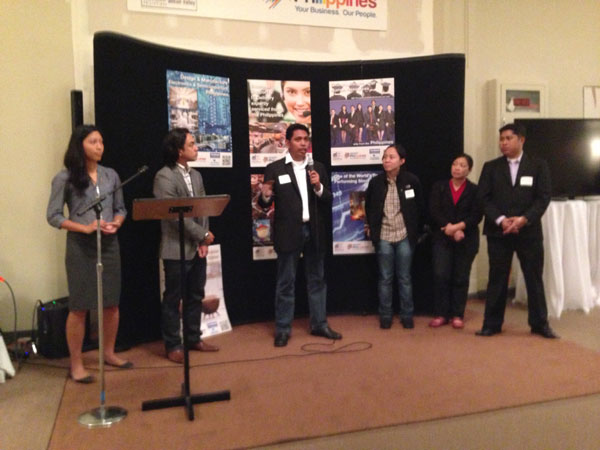
Hackers (from left) Angela Cheng, JR Calanoc, Rolly Rulete, Michie Ang, Rubi Santa Cruz and Jay Albano. PHOTO BY HARVEY BARKIN
SAN FRANCISCO—Time was when a hacker was regarded as a menace.
Many still remember 2000’s disastrous I Love You computer worm, allegedly unleashed unintentionally by a Filipino computer science student and which cost about $5 billion in damages worldwide and forced large corporations, the British parliament, the CIA and the Pentagon to shut down their mail systems.
But there has been a paradigm shift. Much like De La Salle and Ateneo now produce engineers and Mapua, nurses.
Hackers are no longer phreaks or society’s fringe dwellers. In fact, some of them engage in friendly competition and get into business for themselves.
Case in point: PageSnapp and ShootNSell. PageSnapp snagged the top prize in the first Manila AngelHack, the world’s largest hacker event. ShootNSell took the prize in the Singapore event.
PageSnapp’s Rolly Rulete, Jay Albano, Marvin Consuegra, Raymund Delfin and ShootNSell’s Michie Ang and Rubi Santa Cruz were brought stateside by STAC—Silicon Valley and the Philippine Trade & Investment Center in Silicon Valley to showcase their award-winning mobile apps and steer US business their way.
The PageSnapp team from Davao developed a web application that allows businesses to instantly create a mobile app using content from their Facebook pages.
ShootNSell is a mobile app developed by a quartet of three Filipino women and one Singaporean woman that allows one to buy and sell any item in an Instagram-like UI.
Philippine Trade Commissioner Michael Ignacio also unveiled the collaboration between the Philippine Trade & Investment Center in Silicon Valley and One Virtual Source to create onevirtualsource.com (OVS or the Philippine Services Delivery Platform).
The plan is that OVS will be the one global marketplace for Philippine business support, IT and creative services. CEO J.R. Calanoc said their research showed “only two large companies in the cloud-based market that account for 75 percent of freelance work, so there’s room for competition.” He referred to Elance “with 90,000 of the jobs” and Odesk “with 1.5 million of the jobs.”
Calanoc said OVS “is like eBay, but it will sell Philippine services to US and global businesses. It’s a start-up in the US and its pilot country is the Philippines. It provides a platform to bid services at a fraction of the cost.”
OVS started as an idea that came out of conversations in Trade Commissioner Mike Ignacio’s office eight months ago. The quality of freelance work in Odesk and Elance varied so, Calanoc said, “you don’t know what you are getting.”
And, up to now, “the platform is based on individual-size businesses. There are limitations in supporting enterprise-size businesses.”
Couple these with the fact that “there are Filipinos out there who have the skills but are bound by NDAs (non-disclosure agreements),” so they can’t practice their skills. OVS, like Elance and Odesk, is their way out as freelance workers.
Deputy Consul General Jaime Ascalon said the Filipino hackers joked that “in terms of skills, the US just about matches Philippine skills.”
Ascalon intentionally skipped the all-too-familiar spiel of the current boom in the Philippine economy and the rise of Filipino tech talent not just for outsourcing, but also for start-up funding.
He told the assembled group of investors, business owners and technocrats that the resources of the consulate and its partners were geared to “exposing (the hackers) to their counterparts here in the center of the technoverse.”
Both teams had only a few days to be “infected by entrepreneurial spirit” and soak up the new ways of “strategic thinking.” But they eschewed clunky business plans and presented their start-ups in true Silicon Valley style with slide presentations.
Transplanted from Cisco and now president and co-founder of IdeaSpace (the largest industry-led incubator for tech start-ups in the Philippines), Earl Valencia, said that “the two faces of growth in Asia appear in those who live the high life amid those living in the shanties.” But this situation means that “in this market, everything must be cost-efficient in the Philippines.”
Valencia also said that unlike in Silicon Valley, “no one invests in ideas in the Philippines. Even the rich. You need a kakilala (an insider)” to conduct business.
Valencia revealed that new ideas coming from the Philippines included new mining methods, knee joint replacements, water purification and facilitation of money transmittance. All are worthy innovations but not necessarily global like financial apps, as the Silicon Valley experience has taught the hackers.
Valencia said the Philippines “has a striving economy. But that would be the difference that makes for opportunity. What happens in the next 10 to 15 years will define the country.”
Already, anticipation for the Asia-Pacific Economic Cooperation (APEC) meet in Manila in 2015 has shifted the campaign for more investors in the Philippines into overdrive.
But sooner than that, Valencia invited attendees to Geeks on the Beach on Sept. 26 to 27, where it’s the 90-pound weakling’s turn to kick sand in Boracay.